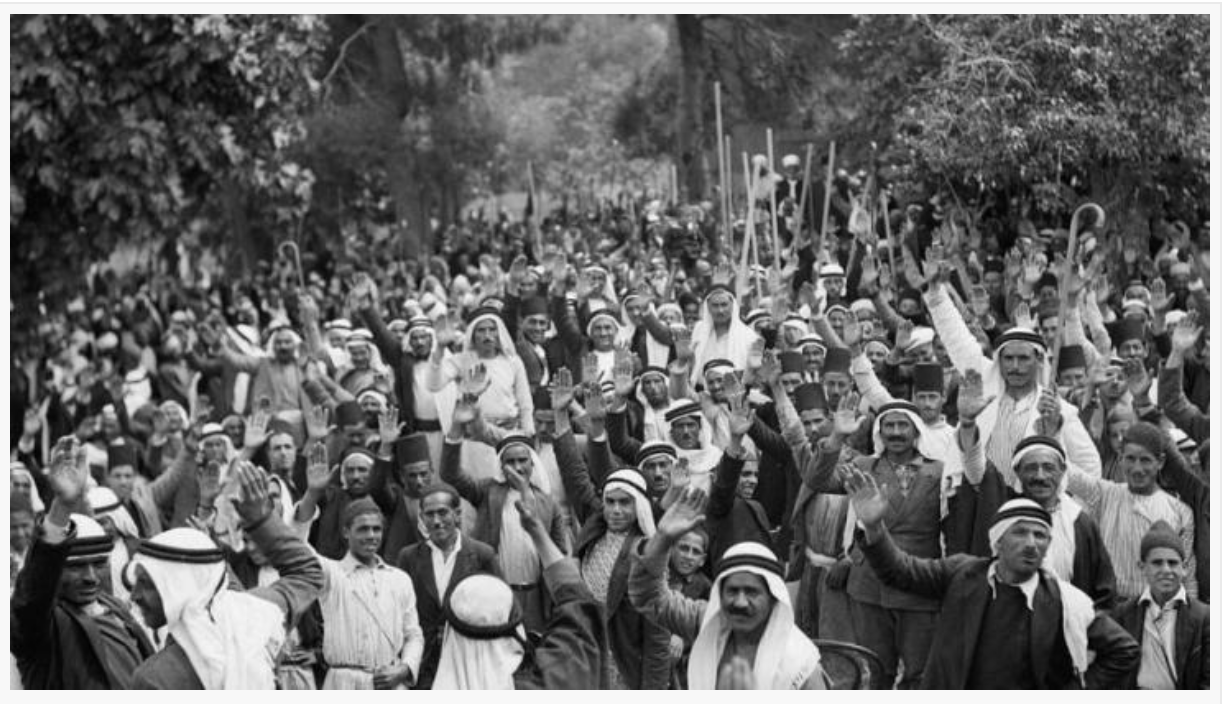There was existing conflict and violence prior to the revolt due to this dissatisfaction, but in April 1936, it turned into a full-fledged rebellion lasting until 1939. The purpose of the revolt was to shift British policy to end large-scale Jewish immigration, ban further land sales to Jews, and enable Palestinian Arabs to establish their own national autonomous government.
The Arab Revolt was the longest sustained national rebellion against British control over Palestine. It was the first organized movement of Arab nationalism which brought together different Arab groups and tribes from all classes for the first time with the common goal to fight against the imminent formation of a Jewish nation in the land. Although, the Arabs in Palestine refused to be called Palestinian. Arabs refused to be referred to as Palestinian as the Jews had embraced the term; creating international agencies to help fund it, developing sporting football (soccer) leagues called the 'Palestine League' comprised of mostly Jewish players who competed internationally, including teams such as Maccabi Tel Aviv, Palestine Police Force, Royal Air Force, and Hapoel Haifa.
The rioting erupted in mostly Arab Jaffa and spilled over into Jewish Tel Aviv, spreading all over Palestine. This led to the deaths of many Jews as well as Arabs. A general strike and political protest were declared led by the 'Arab Higher Committee' which was supervised by Adolph Hitler's Ally, the Grand Mufti of Jerusalem. In addition to this, Jewish farms were destroyed and Jewish civilians were murdered. The destruction of the farms was particularly devastating to the region as for several decades, it was these farms that provided the produce and grains and in the years after the riots, it became difficult to import due to heightened tensions in Europe as Hitler began his conquest of the continent which included Italian and German patrols indiscriminately destroying ships in the Mediterranean Sea.
In October 1936, Lord Peel was appointed by the British government to lead an investigation about the cause of the six-month-long Arab Revolt and the unrest in British-mandated Palestine. This came to be known as the Peel Commission or the Palestine Royal Commission. In July 1937, the Peel Commission published its report which proposed, for the first time, a partition of the land of Palestine into three separate zones: a Jewish state, an Arab state, and a neutral territory containing the holy places (spanning from Jerusalem to Jaffa) which would remain under British authority. It was the Peel Commission that was solely responsible for dashing the hopes of Jews who believed in Lord Balfour and the previous British government's promise to grant ownership of the holy sites to the Jews as part of their state.
The report admitted that the mandate was not effective since the Jewish and Arab objectives in Palestine were incompatible. This resulted in Arab violence and the killing of one of the British commissioners and five Jews. This then brought the members of the Jewish Irgun to retaliate and kill several Palestinian Arabs. The violence went back and forth until the end of 1938.
The British government initially accepted the proposals of the Peel Commission at the 20th Zionist Congress. The Zionists cautiously accepted the partition as it tangibly offered a Jewish state. However, it was rejected by the Arab Higher Committee who still ejected a Jewish presence in the area. This led to the continuation of the revolt targeting the British forces with increased momentum from 1937 to 1938. These riots were suppressed by the British using harsh measures including exiling, arresting, or killing many Arab leaders, dissolving the Arab Higher Committee, and establishing military courts.
The Arabs were left dispirited and disarmed, unable to recover after the revolt. The Zionist Jews, on the other hand, were united behind David Ben Gurion; the Jewish security force, the Haganah, was given permission to arm itself in cooperation and coordination with British forces and the Irgun in attacks against the Arabs. By 1938, the British government, specifically the Woodhead Commission, recognized that the partitioning would be impractical and ultimately rejected the Peel Commission’s report in favor of the initial Balfour proposal to give the Jews all the land west of the Jordan River and leave Trans-Jordan for the Arabs.


